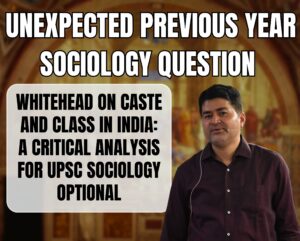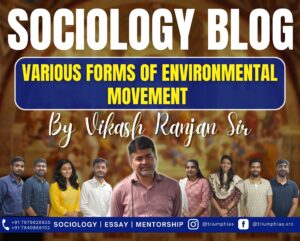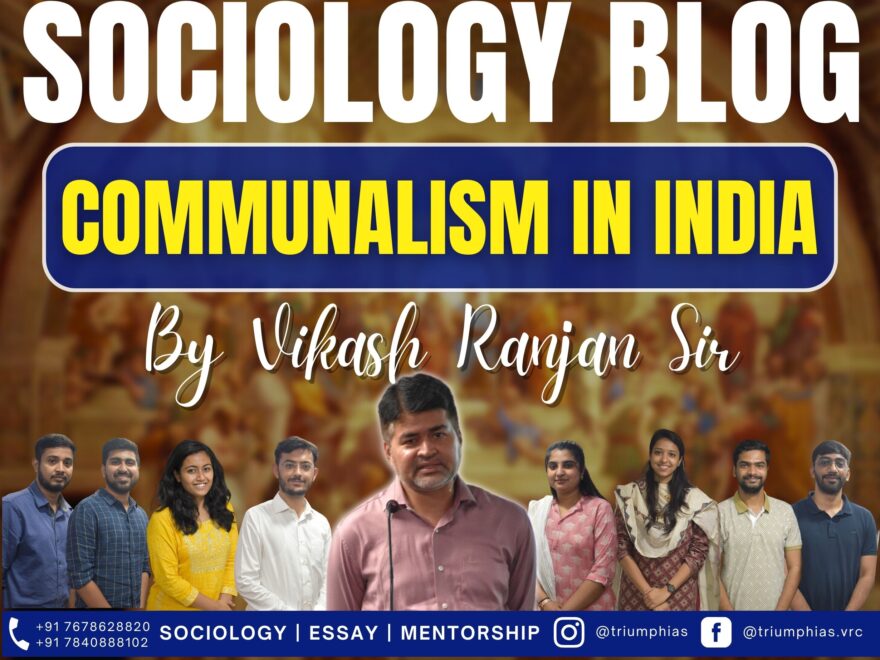Communalism: Detailed Sociological Analysis
(Relevant for Sociology Optional for Civil Services Examination)

Paper 1: Religion and Society
Paper 2: Unit 13- Social Changes in India, Challenges of Social Transformation
(Reference: The Hindu)

Context
The poster of a movie called Razakar — Silent Genocide of Hyderabad, released in July, showed a young man with a religious tuft being impaled by a bayonet.
Communalism
- Communalism refers to the belief in the superiority of one’s own religious community, often leading to conflicts and violence between different religious groups.
- It can also encompass political ideologies that promote this belief, emphasizing the interests of a specific religious community over the broader society.
- Historical Context of Communalism: Communalism in India has historical roots, with British colonial policies exacerbating religious divisions through “divide and rule” strategies, resulting in tensions among different communities. This laid the foundation for communalism to take hold in the modern era.
SOCIOLOGICAL ANALYSIS OF COMMUNALISM AND
|
Reasons behind Communalism
- Divisive Politics: Political parties exploit religious and cultural differences for their own gains, further polarizing communities for electoral purposes.
- Economic Factors: Socio-economic disparities, unemployment, and poverty create an environment conducive to communal tensions, as different groups compete for limited resources.
- Historical Injustices: Communal ideologies can emerge from perceived historical grievances and injustices.
- Media Influence: Irresponsible media coverage, sensationalism, and spread of misinformation through social media contribute to the escalation of communal tensions.
- Religious Revivalism: Revivalist movements within religious communities can promote exclusivism and foster communal ideologies.
Impact of Communalism:
- Violence and Conflict: Communalism often leads to violent clashes between religious groups, resulting in loss of life and property.
- Social Fragmentation: Communalism fractures social cohesion and undermines the pluralistic fabric of Indian society.
- Economic Disruption: Communal violence disrupts economic activities, affecting livelihoods and development.
- Political Instability: Communal tensions can destabilize governance, hindering social progress and policy implementation.
Solutions to Address Communalism:
- Educational Reforms: Introduce value-based education that promotes secularism, tolerance, and interfaith understanding.
- Swift Justice: Ensure speedy trials for communal violence cases and fair compensation for victims.
- Community Engagement: Encourage civil society initiatives that foster communal harmony, dialogue, and cultural exchange.
- Political Accountability: Hold political leaders accountable for divisive rhetoric and actions that fuel communal tensions.
- Media Responsibility: Regulate media to prevent the spread of hate speech and misinformation that fuels communalism.
- Economic Empowerment: Address socio-economic disparities through inclusive policies to reduce competition for resources.
- Historical Awareness: Foster a balanced understanding of history to prevent the distortion of past events for communal agendas.
- Government Initiatives: Strengthen organizations like the National Foundation for Communal Harmony (NFCH) to promote communal harmony and support victims of communal violence.
By adopting a multi-pronged approach that combines educational reforms, legal accountability, community engagement, and socio-economic development, India can effectively combat communalism and work towards a more harmonious and inclusive society.
Related Blogs …
 |
 |

To master these intricacies and fare well in the Sociology Optional Syllabus, aspiring sociologists might benefit from guidance by the Best Sociology Optional Teacher and participation in the Best Sociology Optional Coaching. These avenues provide comprehensive assistance, ensuring a solid understanding of sociology’s diverse methodologies and techniques.
META TAGS:
communalism in india, communalism in india upsc, communalism in indian society, communalism in sociology, communalism in history, communalism started in india, emergence of communalism in india, definition of communalism in sociology, what is communalism in india, Communalism, Sociological Analysis, Media, Religious Divisions, Clifford Geertz, Ram Ahuja, T.N. Madan, Social Fragmentation, Economic Disruption, Political Instability, Solutions
Why Vikash Ranjan’s Classes for Sociology?
Proper guidance and assistance are required to learn the skill of interlinking current happenings with the conventional topics. VIKASH RANJAN SIR at TRIUMPH IAS guides students according to the Recent Trends of UPSC, making him the Best Sociology Teacher for Sociology Optional UPSC.
At Triumph IAS, the Best Sociology Optional Coaching platform, we not only provide the best study material and applied classes for Sociology for IAS but also conduct regular assignments and class tests to assess candidates’ writing skills and understanding of the subject.
Choose The Best Sociology Optional Teacher for IAS Preparation?
At the beginning of the journey for Civil Services Examination preparation, many students face a pivotal decision – selecting their optional subject. Questions such as “which optional subject is the best?” and “which optional subject is the most scoring?” frequently come to mind. Choosing the right optional subject, like choosing the best sociology optional teacher, is a subjective yet vital step that requires a thoughtful decision based on facts. A misstep in this crucial decision can indeed prove disastrous.
Ever since the exam pattern was revamped in 2013, the UPSC has eliminated the need for a second optional subject. Now, candidates have to choose only one optional subject for the UPSC Mains, which has two papers of 250 marks each. One of the compelling choices for many has been the sociology optional. However, it’s strongly advised to decide on your optional subject for mains well ahead of time to get sufficient time to complete the syllabus. After all, most students score similarly in General Studies Papers; it’s the score in the optional subject & essay that contributes significantly to the final selection.
“A sound strategy does not rely solely on the popular
Opinion of toppers or famous YouTubers cum teachers.”
It requires understanding one’s ability, interest, and the relevance of the subject, not just for the exam but also for life in general. Hence, when selecting the best sociology teacher, one must consider the usefulness of sociology optional coaching in General Studies, Essay, and Personality Test.
The choice of the optional subject should be based on objective criteria, such as the nature, scope, and size of the syllabus, uniformity and stability in the question pattern, relevance of the syllabic content in daily life in society, and the availability of study material and guidance. For example, choosing the best sociology optional coaching can ensure access to top-quality study materials and experienced teachers. Always remember, the approach of the UPSC optional subject differs from your academic studies of subjects. Therefore, before settling for sociology optional, you need to analyze the syllabus, previous years’ pattern, subject requirements (be it ideal, visionary, numerical, conceptual theoretical), and your comfort level with the subject.
This decision marks a critical point in your UPSC – CSE journey, potentially determining your success in a career in IAS/Civil Services. Therefore, it’s crucial to choose wisely, whether it’s the optional subject or the best sociology optional teacher. Always base your decision on accurate facts, and never let your emotional biases guide your choices. After all, the search for the best sociology optional coaching is about finding the perfect fit for your unique academic needs and aspirations.
Follow us :
🔎 https://www.instagram.com/triumphias
🔎https://www.youtube.com/c/TriumphIAS
https://t.me/VikashRanjanSociology
Find More Blogs
|
Scope of the subject and comparison with other social sciences |
|||
|
|
|
|
Modernity and social changes in Europe |


One comment